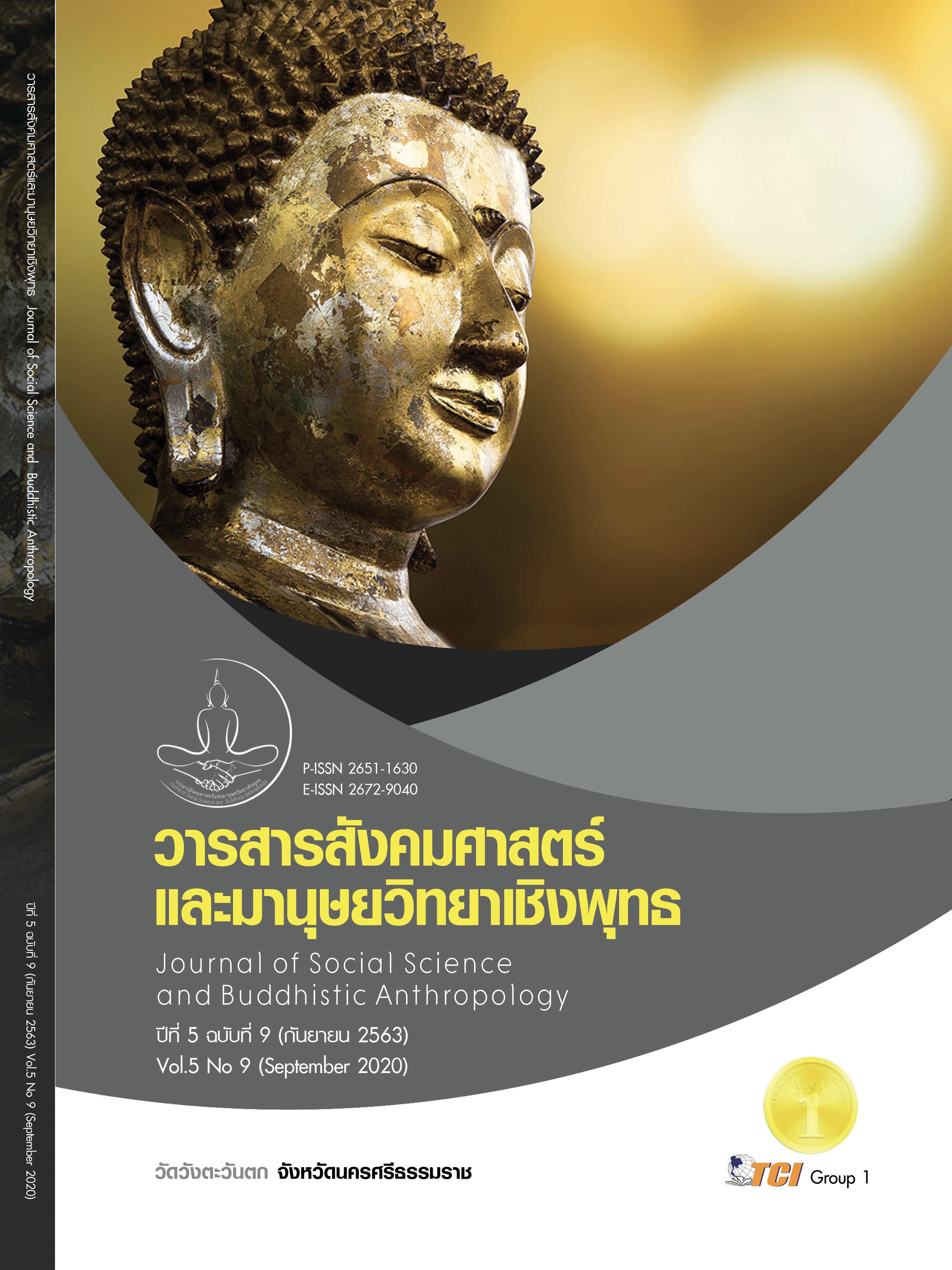THE EFFICIENCY OF DEVELOPMENT OF LIFE QUALITY OF THE ELDERLY PEOPLE IN BANGKOK
Keywords:
Elderly Health Management, Social Participation, The Development of Life the ElderlyAbstract
The objectives of this research were to study 1) the level of government policy, elderly environment, elderly health management, social participation and the quality of life development of the elderly and 2) the influence of government policy, elderly environment, elderly health management, social participation affects the quality of life development of the elderly and 3) guidelines to enhance the effectiveness of quality of life development of the elderly. This research employed a mixed research methodology combining quantitative and qualitative methods. For the quantitative research part, the sample consisted of member of the elderly club from 10 district offices total 300 individuals. The sample size was determined based on the criterion 20 times the observe variables. They were selected by proportional stratified sampling. Data were collected via the use of a questionnaire and analyzed with descriptive analysis and a structural equation model. As for the qualitative research component, in-depth interviews were conducted with 10 executives of related associations. Data were then analyzed by content analysis. The research findings showed that: 1) Social participation and the efficiency of quality of life development of the elderly were rated at a high level. For government policy, elderly environment and elderly health management were rated at a highest level 2) government policy, elderly environment, elderly health management and social participation affects the quality of life development of the elderly. Government policy affects the quality of life development of the elderly was rated at a highest level, next are elderly environment and elderly health management consecutively, and 3) effectiveness of the quality of life development of the elderly can be managed with the integration systematically in every management level including sharing the information source.
References
กรมกิจการผู้สูงอายุ. (2560). ชุดความรู้การดูแลตนเองและพัฒนาศักยภาพผู้สูงอายุ “เรียนรู้สังคม”. กรุงเทพมหานคร: กรมกิจการผู้สูงอายุ.
กรมกิจการผู้สูงอายุ. (2561). สถิติผู้สูงอายุ. เรียกใช้เมื่อ 20 กันยายน 2562 จาก http://www. dop.go.th/th/know/1.
ขวัญดาว กล่ำรัตน์. (2554). ปัจจัยเชิงสาเหตุของพฤติกรรมสุขภาพของผู้สูงอายุในเขตภูมิภาคตะวันตกของประเทศไทย. ใน ดุษฎีนิพนธ์ศึกษาศาสตรดุษฎีบัณฑิต สาขาวิชาการศึกษาตลอดชีวิตและการพัฒนามนุษย์. มหาวิทยาลัยศิลปากร.
เจษณี จันทวงศ์. (2561). การพัฒนาอาชีพผู้สูงอายุในประเทศไทย. . ใน รายงานสืบเนื่องการประชุมวิชาการระดับชาติ ครั้งที่ 3 “อาเซียนบนเส้นทางของประชาคม”. มหาวิทยาลัยรามคำแหง.
ฐิติพร ภักดีพิบูลย์. (2562). การออกกำลังกายในผู้สูงอายุ. เรียกใช้เมื่อ 3 ธันวาคม 2562 จาก http://www.thairath.co.th/lifestyle/woman/health/1528755.
ณัฐธิดา จุมปา และเพ็ญพักตร์ ไชยนุรักษ์. (2561). สิ่งอำนวยความสะดวกที่เหมาะสมและปลอดภัยเพื่อผู้สูงอายุและผู้พิการกับการพัฒนาคุณภาพชีวิตสร้างความเสมอภาคในสังคม: กรณีศึกษาชุมชนชำติพันธุ์บนพื้นที่สูงจังหวัดเชียงราย. Veridian E Journal ฉบับภาษาไทย สาขามนุษยศาสตร์สังคมศาสตร์และศิลปะ, 11(3), 1508-1509.
ไตรรัตน์ จารุทัศน์. (2556). คู่มือการจัดสิ่งอำนวยความสะดวก โครงการการจัดการความรู้อาคาร-สถานที่ที่เป็นมิตรสำหรับผู้สูงอายุ. กรุงเทพมหานคร: สำนักงานกองทุนสนับสนุนการสร้างเสริมสุขภาพ (สสส.).
พรชุลีย์ นิลวิเศษ. (2551). นันทนาการสำหรับผู้สูงอายุ. เรียกใช้เมื่อ 3 ธันวาคม 2562 จาก https://www.stou.ac.th/stoukc/elder/main1_10.html.
มหาวิทยาลัยสุโขทัยธรรมาธิราช. (2557). สังคมผู้สูงอายุ: นัยต่อการพัฒนาเศรษฐกิจ. เรียกใช้เมื่อ 8 มกราคม 2563 จาก www.stou.ac.th/stounline/lom/data/.
ศูนย์ช่วยเหลือสังคม. (2562). สถิติข้อมูลผู้สูงอายุผู้ประสบปัญหาทางการสังคม. กรุงเทพมหานคร: แอพพลิเคชั่นศูนย์ช่วยเหลือสังคม.
อรวรรณ พิชิตไชยพิทักษ์. (2561). ผู้สูงอายุ ออกกำลังกายอย่างไรจึงเหมาะสม. กรุงเทพมหานคร: ฝ่ายการพยาบาล คณะแพทยศาสตร์โรงพยาบาลรามาธิบดี มหาวิทยาลัยมหิดล.
อริสรา สุขวัจน. (2555). การออกกำลังกายสำหรับผู้สูงอายุ. วารสารศรีนครินทรวิโรฒวิจัยและพัฒนา สาขามนุษยศาสตร์และสังคมศาสตร์, 4(8), 216-228.
Miller, F. A. (1986). Planned Pastoral Care: A Guide for Teachers. London: McGraw-Hill.
The WHOQOL Group. (1995). The World Health Organization Quality of Life Assessment (WHOQOL): position paper from the World Health Organization. Social Sciences Medicine, 41(10), 1403-1413.









